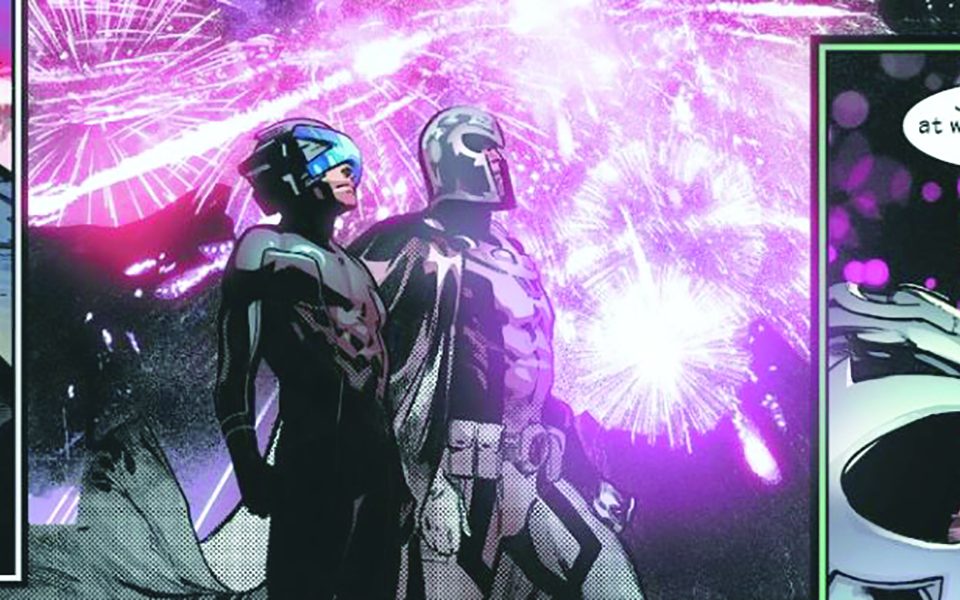
by Jermaine Exum
From movies and cartoons, to action figures and comic books, we love the X-Men — those exciting and eclectic individuals born with unique attributes and abilities. Those mutants.
The first issue of Stan Lee and Jack Kirby’s X-Men featuring Charles Xavier’s initial class of gifted youngsters debuted in 1963, but the series was far from popular. New stories ceased publication in 1970.
In 1975, Marvel Comics reinvested in the concept with Giant-Size X-Men #1 which saw Professor X assemble a new group of mutants to rescue his original students from a mutant ecosystem called Krakoa! This highly volatile group including Storm, Nightcrawler and Wolverine would in time lead to a multimedia explosion that would make them household names and pop-culture icons.But what is X-Men’s concept really about? What makes X-Men different from the Avengers or Fantastic Four? Beyond the costumes and powers to control weather, or heal from catastrophic injuries, the core story of X-Men is about being different and the hope for acceptance. The ongoing and relatable struggle for equal standing and consideration in society. The years preceding X-Men #1’s release saw the Greensboro Woolworths Sit-In, the integration of New Orleans’ Frantz Elementary School, the Freedom Rides and other turning points in the Civil Rights Movement.
Did Stan Lee intend for the story of the mutants to be an allegory for the Civil Rights Movement? Were Xavier and Magneto stand-ins for Martin Luther King Jr and Malcolm X’s opposing ideals? That debate goes on, but 1968’s Stan’s Soapbox Editorial feature where Lee declared racial prejudice and bigotry to be the deadliest of social ills suggests he may have had awareness at some point. Writer Chris Claremont’s X-Men “God Loves, Man Kills” and other stories more firmly connected the plight of the mutants to that of those persecuted and oppressed in our world. Despite victories and strides forward, as the real world experienced the same, mutants were still persecuted and killed in the streets globally in the Marvel Universe.
Decades later, in 2019, prolific writer Jonathan Hickman was presented with the opportunity to totally revitalize and redefine the X-Men brand and what it could mean today and moving forward. This bold initiative known as House of X/ Powers of X (Ten) was a sales blockbuster for comic-book stores the likes of which had not been seen in years.
While not a reboot of any kind, this story looked into the X-Men’s established past for the core concept that sees incredible new information abruptly change Xavier’s outlook on Human-Mutant relations. From the island nation of Krakoa, Xavier has made humanity a jaw-dropping ultimatum containing an offer to those who wish profitable co-existence and a stern warning to those who do not. This is not a what-if or alternate world. The tables have turned for the first time with the mutants in a never-before held position of power. Under the motto, “Krakoa is for all Mutants,” Xavier has his created an environment that offers for the very first time a common language, culture, laws and even religion for mutantkind. This stunning initiative saw Magneto and Apocalypse agree to but is not without consequences, such as resistance from other nations, violent response from unrelated organizations galvanized by fear, scrutiny from the superhero community and pushback across the Marvel Universe with House of X/ Powers of X as the illuminating catalytic moment.
The story evolves weekly in a comic shop near you, in various new monthly series and quarterly graphic novels for such as X-Men, New Mutants, X-Force and others, propelled forward by the best artists and writers of the day.
Marvel Comics reflects the world outside your window and Marvel’s mighty mutants have caught up if not gotten ahead of today’s changing world. The X-Men still swear to protect a world that feared and hates them, but now it will be on their own terms and now is the time to read X-men comics.
Jermain Exum, proprietor of Acme Comics in Greensboro, has been reading the X-Men since 1986.
Join the First Amendment Society, a membership that goes directly to funding TCB‘s newsroom.
We believe that reporting can save the world.
The TCB First Amendment Society recognizes the vital role of a free, unfettered press with a bundling of local experiences designed to build community, and unique engagements with our newsroom that will help you understand, and shape, local journalism’s critical role in uplifting the people in our cities.
All revenue goes directly into the newsroom as reporters’ salaries and freelance commissions.


Leave a Reply